Posted: November 7th, 2014 | Author: Sven | Filed under: Data Sharing, EDaWaX | Tags: academic publishing, economics | Comments Off on Open Access to Data: An Ideal Professed but not Practised
 The two economists Patrick Andreoli-Versbach and Frank Mueller-Langer (both from the Max Planck Institute for Innovation and Competition in Munich) have published a new paper in Research Policy in which they analyse the data-sharing behaviour of 488 randomly selected empirical researchers.*
The two economists Patrick Andreoli-Versbach and Frank Mueller-Langer (both from the Max Planck Institute for Innovation and Competition in Munich) have published a new paper in Research Policy in which they analyse the data-sharing behaviour of 488 randomly selected empirical researchers.*
Andreoli-Versbach and Mueller-Langer (2014) provide evidence that most researchers in economics and management do not share their data voluntarily. The authors Read the rest of this entry »
Posted: September 18th, 2014 | Author: Sven | Filed under: EDaWaX, German, Research Data | Tags: data citation, data documentation, data sources, Guidebook, persistent identifiers | Comments Off on Guidebook “Discover-Cite-Document: Research Data in the Social Sciences and Economics” published
 After almost eight months of intense collaborative work, we are happy to announce the release of a guidebook on research data in the social sciences and economics. The idea of writing the guidebook was born in the course of a panel session on last year’s annual meeting of the “Verein für Socialpolitik” (VfS), the largest German-speaking economists association, where Jutta Günther (Halle Institute for Economic Research), Klaus Tochtermann (ZBW), Gert G. Wagner (German Data Forum and DIW Berlin) and Stefan Winkler-Nees (German Research Foundation) discussed both the potential and the need of data sharing in applied economics.
After almost eight months of intense collaborative work, we are happy to announce the release of a guidebook on research data in the social sciences and economics. The idea of writing the guidebook was born in the course of a panel session on last year’s annual meeting of the “Verein für Socialpolitik” (VfS), the largest German-speaking economists association, where Jutta Günther (Halle Institute for Economic Research), Klaus Tochtermann (ZBW), Gert G. Wagner (German Data Forum and DIW Berlin) and Stefan Winkler-Nees (German Research Foundation) discussed both the potential and the need of data sharing in applied economics.
The panellists assessed that there currently is a lack of information on data documentation and citation in academic education.
Consequently, together with our partners from DIW Berlin, GESIS and the German Data Forum, we started to gather information on these topics. One year after the initial panel discussion, the hot off the press booklet was presented at this year’s annual meeting of the Verein für Socialpolitik two weeks ago.
Read the rest of this entry »
Posted: June 25th, 2014 | Author: Sven | Filed under: EDaWaX, Projects | Tags: DOI, Linking Data and Publications, persistent identifiers | 1 Comment »
 We are very happy to announce that our research funding organisation, the German Research Foundation (DFG), has granted another two years of funding for our project.
We are very happy to announce that our research funding organisation, the German Research Foundation (DFG), has granted another two years of funding for our project.
In their final report, based on the good results of the project’s first funding phase, the reviewers concluded that EDaWaX’s planning for expanding the pilot application and for undertaking a detailed analysis of journals in business studies should be supported with “high”, respectively “highest priority.” Read the rest of this entry »
Posted: April 15th, 2014 | Author: Sven | Filed under: EDaWaX | Tags: data centres, research data management, social sciences | Comments Off on LIBER Quarterly publishes special issue on “Research data and new forms of scholarly communication”
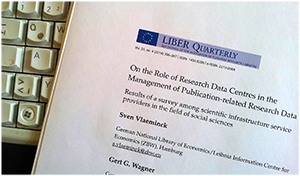 LIBER Quarterly, a peer-reviewed journal managed by LIBER (the Association of European Research Libraries), has just published a special issue on research data and new forms of scholarly communication.
LIBER Quarterly, a peer-reviewed journal managed by LIBER (the Association of European Research Libraries), has just published a special issue on research data and new forms of scholarly communication.
In the editorial, the guest editors of this special issue, Donatella Castelli and Wolfram Horstmann, emphasised that
[…] researchers have realized that the current scholarly communication model, based exclusively on articles, is inherently limited and inefficient, even when all articles are in digital form and accessible through the Web. Communication is effective if and only if the recipient of the information, who is often not known beforehand, can comprehend, scrutinize, challenge and reproduce the findings presented.
Read the rest of this entry »
Posted: December 20th, 2013 | Author: Sven | Filed under: EDaWaX | Comments Off on Merry Christmas and a happy new year!
 The year draws to a close – a very good reason to sum up some of our activities in 2013:
The year draws to a close – a very good reason to sum up some of our activities in 2013:
First of all, the EDaWaX-project team wants to thank our projects partners, our cooperations and funders but also all our readers for a very successful year.
Our first funding phase has come to an end and we are really happy about all the things we could achieve in 2013:
– we developed a pilot application for managing publication-related research data in economics journals. Read the rest of this entry »
Posted: November 27th, 2013 | Author: Sven | Filed under: EDaWaX, Workshop | Tags: Data Policies, Data Sharing, pilot application, Replication | 1 Comment »
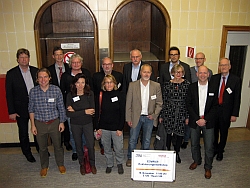 A week ago our project held its final evaluation workshop. We presented the main results of some of our work packages and also introduced a beta version of our pilot application for the management of publication-related research data in journals.
A week ago our project held its final evaluation workshop. We presented the main results of some of our work packages and also introduced a beta version of our pilot application for the management of publication-related research data in journals.
In preparation of the workshop we invited more than 30 editors of scholarly journals and almost a dozen scientists from 15 journals accepted our invitation. Read the rest of this entry »
Posted: November 1st, 2013 | Author: Sven | Filed under: EDaWaX, Report | Tags: RDM, research data centres, WP3 | 2 Comments »
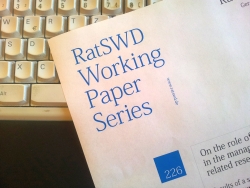 Our project currently has published the results of our work package 3 in which we analyzed the role of research data centres with regard to management of publication-related research data. This working paper presents the results of a survey among these scientific infrastructure service providers.
Our project currently has published the results of our work package 3 in which we analyzed the role of research data centres with regard to management of publication-related research data. This working paper presents the results of a survey among these scientific infrastructure service providers.
By conducting a desk research and an online survey, we found out that almost three quarters of all responding research data centres, archives and libraries generally store externally generated research data – what also applies to publication-related data.
Almost 75% of all respondents also store and host the code of computation (the syntax of statistical analyses). If self-compiled software components have been used to generate research outputs, only 40% of all respondents accept these software components for storing and hosting.
Eight in ten institutions also stated that they are taking specific actions for digital long-term preservation of their data. In regard to the documentation of stored and hosted research data almost 70% of all respondents claimed to use the metadata schema of the Data Documentation Initiative (DDI); Dublin Core was used by 30 percent (multiple answers were permitted). Almost two thirds also used persistent identifiers to facilitate citation of these datasets. Three in four respondents also stated to support researchers in creating metadata for their data. Application programming interfaces (APIs) for uploading or searching datasets currently have not been implemented by any of the respondents yet. Little widespread is the use of semantic technologies like RDF.
A German version of the paper is also available.
Photo: S. Vlaeminck. License: CC-BY-SA 3.0 DE
Posted: October 11th, 2013 | Author: Sven | Filed under: Conference, EDaWaX, Report | Tags: Research Data, research paper | Comments Off on EDaWaX: State of affairs
 As you might have noticed, currently I don’t have much time to publish new articles on the blog. The reason is that our project is currently publishing a lot of the results we achieved in the course of the last two years.
As you might have noticed, currently I don’t have much time to publish new articles on the blog. The reason is that our project is currently publishing a lot of the results we achieved in the course of the last two years.
One of these publications has been published yesterday – it is a nice summary of the project’s main results, but still not all of them. The paper “Replizierbare Forschung in den Wirtschaftswissenschaften erhöhen – Eine Herausforderung für wissenschaftliche Infrastrukturdienstleister” is available online. Read the rest of this entry »
Posted: September 16th, 2013 | Author: Sven | Filed under: EDaWaX, Research Data | Tags: Data Sharing, economics | 2 Comments »
 Experts say research data management should be an integral part of university curricula
Experts say research data management should be an integral part of university curricula
Panel of experts recommends the integration of research data management into the university curricula of young researchers. The ZBW – Leibniz Information Centre for Economics and the German Data Forum initiated a debate on the topic at the annual meeting of the Verein für Socialpolitik, the most prestigious professional association of German-speaking economists, held in Düsseldorf from 4 to 7 September 2013. Read the rest of this entry »
Posted: September 3rd, 2013 | Author: Sven | Filed under: EDaWaX | Tags: ckan, prototype, Software | 6 Comments »
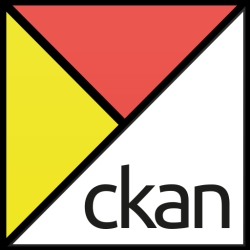 One aim of EDaWaX is to develop and implement a web-platform prototype for a publication-related research data archive. We’ve chosen CKAN –an open source data portal platform– as basis for this prototype.
One aim of EDaWaX is to develop and implement a web-platform prototype for a publication-related research data archive. We’ve chosen CKAN –an open source data portal platform– as basis for this prototype.
This post describes the reasons for this decision and tries to give some insights in CKAN, its features and technology. We’ll also discuss these features both in regard to our special use case and to the suitability for research data management in general.
Read the rest of this entry »
Posted: August 1st, 2013 | Author: Sven | Filed under: EDaWaX | Tags: metadata, WP5 | Comments Off on Metadata for publication-related Data Archives: As much as necessary and as little as posssible
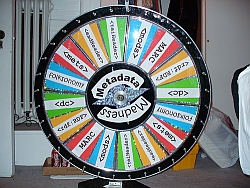 In the course of our project we had to deal with a work package (WP5) in which we had to develop (or at least to choose) a metadata schema capable of describing and labelling publication-related metadata. Today I would like to summarize our approach and some of our thoughts for choosing an appropriate metadata schema.
In the course of our project we had to deal with a work package (WP5) in which we had to develop (or at least to choose) a metadata schema capable of describing and labelling publication-related metadata. Today I would like to summarize our approach and some of our thoughts for choosing an appropriate metadata schema.
I already characterised our approach in my talk at the IASSIST 2013 conference, but I would like to describe it more in-depth to start a discussion with researchers and the community, so feel free to comment.
In a first move we evaluated the data and further materials we found in the data archives of economics journals. These types of data we found within the journals’ data archives were seen as functional requirements, because the metadata schema should be capable to describe these data.
We focussed on a schema that should be capable to describe quantitative data – mainly because qualitative approaches are rare in Economics. Read the rest of this entry »
Posted: June 18th, 2013 | Author: Sven | Filed under: EDaWaX | Tags: data archvies, Data Policies, Report | Comments Off on EDaWaX: New Article published
 Last year our project won the LIBER-Award for Library Innovation 2012. Now our paper was published in LIBER-Quarterly, the peer-reviewed journal of the Association of European Research Libaries.
Last year our project won the LIBER-Award for Library Innovation 2012. Now our paper was published in LIBER-Quarterly, the peer-reviewed journal of the Association of European Research Libaries.
In this paper we summarize the findings of an empirical study conducted by the EDaWaX-Project. 141 economics journals were examined regarding the quality and extent of data availability policies that should support replications of published empirical results in economics. This paper suggests criteria for such policies that aim to facilitate replications. These criteria were also used for analysing the data availability policies we found in our sample and to identify best practices for data policies of scholarly journals in economics. In addition, we also evaluated the journals’ data archives and checked the percentage of articles associated with research data. To conclude, an appraisal as to how scientific libraries might support the linkage of publications to underlying research data in cooperation with researchers, editors, publishers and data centres is presented.
I’m very happy that this article is online now and want to thank the team of LIBER Quarterly for their support.
Of course this article mainly reflects an early part of our research only, but other publications will follow in late summer and automn this year.
The article “Data Management in Scholarly Journals and Possible Roles for Libraries — Some Insights from EDaWaX” is available in html- and in pdf-format.
Photo: “Tippen” by Jorma Bork / pixelio.de. License:>click<
Posted: March 4th, 2013 | Author: Sven | Filed under: Data Sharing, EDaWaX | Tags: incentives, research paper | 4 Comments »
 In the context of our research project EDaWaX a new research paper has been published by Patrick Andreoli-Versbach (International Max Planck Research School for Competition and Innovation (IMPRS-CI), LMU Munich, Munich Center for Innovation and Entrepreneurship Research (MCIER)) and Frank Mueller-Langer (Max Planck Institute for Intellectual Property and Competition Law, IMPRS-CI, MCIER).
In the context of our research project EDaWaX a new research paper has been published by Patrick Andreoli-Versbach (International Max Planck Research School for Competition and Innovation (IMPRS-CI), LMU Munich, Munich Center for Innovation and Entrepreneurship Research (MCIER)) and Frank Mueller-Langer (Max Planck Institute for Intellectual Property and Competition Law, IMPRS-CI, MCIER).
The paper analyzes the data sharing behavior of 488 randomly chosen empirical economists. More specifically, the researchers under study were chosen uniformly across the top 100 economics departments and the top 50 business schools and randomly within the respective institution. Economics departments were chosen using the Shanghai Ranking 2011 in Economics and Business and business schools were chosen using the Financial Times Global MBA Ranking 2011.
Read the rest of this entry »
Posted: January 25th, 2013 | Author: Sven | Filed under: EDaWaX, Research Data | Tags: data centres, hosting | Comments Off on Results of the EDaWaX Online Survey on Hosting Options for publication-related Research Data
 In October and November 2012 our project started an online-survey among national and international research data centres, archives, library networks and libraries. The aim of our survey was to evaluate the opportunities to store and host a publication-related research data archive in the above mentioned organisations.
In October and November 2012 our project started an online-survey among national and international research data centres, archives, library networks and libraries. The aim of our survey was to evaluate the opportunities to store and host a publication-related research data archive in the above mentioned organisations.
In our opinion in particular research data centres, but also archives and libraries are very well qualified to take care of these data.
In our survey we checked the general possiblity to host and store different types of research data.
Now we completed our analyses. The results we obtained are listed below.
Read the rest of this entry »
Posted: December 10th, 2012 | Author: Sven | Filed under: Data Policy, EDaWaX | Tags: academic publishing, Data Policies, Data Sharing, Linking Data and Publications | 1 Comment »
This article is cross-posted from the blog of the Open Economics Working Group
Background
 In Economics, as in many other research disciplines, there is a continuous increase in the number of papers where authors have collected their own research data or used external datasets. However, so far there have been few effective means of replicating the results of economic research within the framework of the corresponding article, of verifying them and making them available for repurposing or using in the support of the scholarly debate.
In Economics, as in many other research disciplines, there is a continuous increase in the number of papers where authors have collected their own research data or used external datasets. However, so far there have been few effective means of replicating the results of economic research within the framework of the corresponding article, of verifying them and making them available for repurposing or using in the support of the scholarly debate.
In the light of these findings B.D. McCullough pointed out: “Results published in economic journals are accepted at face value and rarely subjected to the independent verification that is the cornerstone of the scientific method. Most results published in economics journals cannot be subjected to verification, even in principle, because authors typically are not required to make their data and code available for verification.” (McCullough/McGeary/Harrison: “Lessons from the JMCB Archive”, 2006)
Harvard Professor Gary King also asked: “[I]f the empirical basis for an article or book cannot be reproduced, of what use to the discipline are its conclusions? What purpose does an article like this serve?” (King: “Replication, Replication” 1995). Therefore, the management of research data should be considered an important aspect of the economic profession.
Read the rest of this entry »
 The two economists Patrick Andreoli-Versbach and Frank Mueller-Langer (both from the Max Planck Institute for Innovation and Competition in Munich) have published a new paper in Research Policy in which they analyse the data-sharing behaviour of 488 randomly selected empirical researchers.*
The two economists Patrick Andreoli-Versbach and Frank Mueller-Langer (both from the Max Planck Institute for Innovation and Competition in Munich) have published a new paper in Research Policy in which they analyse the data-sharing behaviour of 488 randomly selected empirical researchers.*

 We are very happy to announce that our research funding organisation, the German Research Foundation (
We are very happy to announce that our research funding organisation, the German Research Foundation ( LIBER Quarterly, a peer-reviewed journal managed by
LIBER Quarterly, a peer-reviewed journal managed by  The year draws to a close – a very good reason to sum up some of our activities in 2013:
The year draws to a close – a very good reason to sum up some of our activities in 2013:
 Our project currently has
Our project currently has  As you might have noticed, currently I don’t have much time to publish new articles on the blog. The reason is that our project is currently publishing a lot of the results we achieved in the course of the last two years.
As you might have noticed, currently I don’t have much time to publish new articles on the blog. The reason is that our project is currently publishing a lot of the results we achieved in the course of the last two years. Experts say research data management should be an integral part of university curricula
Experts say research data management should be an integral part of university curricula One aim of
One aim of  In the course of our project we had to deal with a work package (WP5) in which we had to develop (or at least to choose) a metadata schema capable of describing and labelling publication-related metadata. Today I would like to summarize our approach and some of our thoughts for choosing an appropriate metadata schema.
In the course of our project we had to deal with a work package (WP5) in which we had to develop (or at least to choose) a metadata schema capable of describing and labelling publication-related metadata. Today I would like to summarize our approach and some of our thoughts for choosing an appropriate metadata schema. In Economics, as in many other research disciplines, there is a continuous increase in the number of papers where authors have collected their own research data or used external datasets. However, so far there have been few effective means of replicating the results of economic research within the framework of the corresponding article, of verifying them and making them available for repurposing or using in the support of the scholarly debate.
In Economics, as in many other research disciplines, there is a continuous increase in the number of papers where authors have collected their own research data or used external datasets. However, so far there have been few effective means of replicating the results of economic research within the framework of the corresponding article, of verifying them and making them available for repurposing or using in the support of the scholarly debate.





